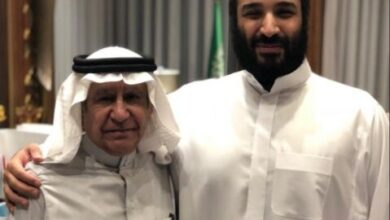Lawsuit against the Saudi regime for piracy

Britain’s Supreme Court has given the green light to dissident Ghanem Al-Dossary to file a lawsuit against the Saudi regime for a sophisticated hacking campaign for his phone.
The decision to allow al-Dosari to file the case means that he has a “debatable issue” and legitimacy.
It is the first time that Britain has allowed him to sue the Saudi regime, Dossari, who is believed to be living under police protection in London, said in a Tweet on Twitter.
The British Guardian newspaper confirmed that the country’s supreme court granted Al-Dosari the ability to sue Saudi Arabia for piracy incidents.
These developments coincided with the revelation that the Crown Prince Mohammed bin Salman stood behind to penetrate the phone of the Amazon CEO, “Jeff Bezos”, in a period coinciding with the murder of journalist Jamal Khashoggi in early October 2018.
This is a rare case in Britain against the Saudi regime, and a spokesman at Lee Day, a law firm, said: “We are pleased that the court has agreed to look into the circumstances of the case and target a person living in the United Kingdom.”
He pointed out that the British authorities are now ready to enable them to take formal action in the case against the Saudi regime.
In turn, the United Nations Rapporteur for Extrajudicial Killings, Agnes Calamard, commented on the court’s decision, saying in a tweet to her saying: “A decisive development… The Supreme Court approves the lawsuit filed by Saudi dissident Ghanem Al-Dossari against the Kingdom of Saudi Arabia, because of the deliberate penetration of his phone.”
Al-Dosari is a Saudi human rights activist who has an active presence on YouTube to criticize the Saudi regime.
The lawsuit accuses the Saudi regime of masterminding a breach against “Al-Dossary” phones on June 23, 2018, just two months after the “Bezos” phone was hacked, according to the Guardian newspaper.
The hacking process resulted in the theft of information related to the personal life of the Saudi dissident, his family, his relationships, health, money and issues related to his work in promoting human rights in the Kingdom.
The Saudi regime is at the forefront of authoritarian regimes that suppress any opposition on social media, using various disgraceful methods.
The Saudi regime used social media platforms and traditional media outlets to track, tighten and suppress citizens.
The regime is restricting freedoms in media platforms, given the fact that traditional media outlets and the press, especially newspapers and TV channels, have always been state-owned.
While social media has become widespread and more technologically advanced, and with the arrival of Middle Eastern youth on the Internet and digital platforms, including Facebook, Twitter, WhatsApp and Instagram, repressive regimes led by the Saudi regime began to use new methods and technologies to control citizens and track dissidents locally and internationally.
Ruling regimes in the Kingdom, the Emirates, Bahrain, Egypt and other Middle Eastern countries have used Israeli cyber-security techniques to target and track down dissidents on social media from Turkey to Canada, and from England to Malaysia
The Israeli software company, “NSO Group”, has sold tracking and piracy technologies to despots around the world, from the Kingdom to India, including many Arab authoritarian regimes.
The Israeli company hacker program, “Pegasus”, provided access to a record of phone calls and messages of Saudi opponents, such as Jamal Khashoggi and Omar Abdulaziz, who sought asylum in Canada, including Twitter and WhatsApp messages.
The widespread use of espionage and surveillance technologies by authoritarian regimes has resulted in comprehensive and systematic human rights violations.
The US Justice Department has previously accused two Twitter company employees, including a Saudi citizen named Ali Al-Zubarah, and American citizen Ahmed Abu Amo, of using their positions in the company and their ability to access internal Twitter systems to help Saudi Arabia obtain information about American citizens and Saudi dissidents who opposed the Kingdom’s policies and leaders.
The Ministry of Justice also accused Ahmed al-Mutairi, a Saudi citizen, of acting as a go-between for the Zubarah and Saudi intelligence services close to Crown Prince Muhammad bin Salman, with the aim of transmitting sensitive information about Twitter users to the Al Saud regime.
The Saudi regime not only cracks down on dissidents on social media, but against political and social reform, civic participation, human rights and democracy.





